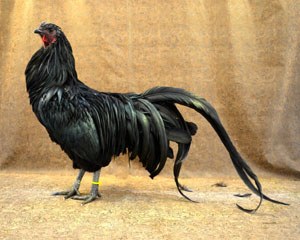Sumatra Chickens
 The Sumatra originates from the Island of Sumatra, from which it was named. It also
is found on other surrounding islands such as Java and Borneo. This Island bird was
recognized by the APA in 1883 then brought into the British standard in 1907.
The Sumatra originates from the Island of Sumatra, from which it was named. It also
is found on other surrounding islands such as Java and Borneo. This Island bird was
recognized by the APA in 1883 then brought into the British standard in 1907.
Characteristics
Sumatras are a distinctive fowl which look less like domestic poultry than other chickens. They have rather long tails carried low enough to appear drooping. They have multiple spurs on each leg, dark purple faces and a high degree of greenish luster on jet black plumage. These fowls have a pea comb, red wattles and dark earlobes. Their shanks are leaden gray. Sumatras are generally not aggressive, however, cockerels are known to be agitated during breeding season. Hens do go broody and are considered good mothers. They are active and watchful birds. Sumatras are seasonal birds, in the way that they breed, which is generally around the early Spring and lasting a few months.
Standard Weights
- APA
- Cock: 5 lbs
- Hen: 4 lbs
- Cockerel: 4 lbs
- Pullet: 3.5 lbs
- PCGB
- Cock: 2.25-2.70 kg
- Hen: 1.80 kg
Varieties
- Blue
- Black
- White
There are other varieties not recognized by the APA or PCGB.
Skin Color
Yellow.
Egg Shell Color
White or light tint.
Use
The Sumatra is used for eggs and ornamental purposes.
References
Chicken Breeds and Varieties (A2880), John L. Skinner, University of Wisconsin-Madison
Ekarius, Carol. "Chickens: Sumatra." Pocketful of Poultry: Chickens, Ducks, Geese, Turkeys. North Adams, MA: Storey Pub., 2007. 162-63. Print.
Lewis, Celia. "Breed Profiles: Sumatra." The Illustrated Guide to Chickens: How to Choose Them, How to Keep Them. New York: Skyhorse Pub., 2011. 162. Print.
Roberts, Victoria. British Poultry Standards (6th Edition). Hoboken, NJ, USA: Wiley-Blackwell, 2009. ProQuest ebrary. Web. 8 July 2015.
"Sumatra Chicken." The Livestock Conservancy. The Livestock Conservancy, n.d. Web. 08 July 2015.
